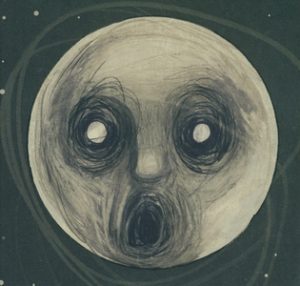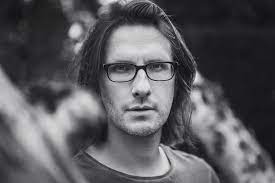HIT CHANNEL EXCLUSIVE INTERVIEW: June 2013. We had the great pleasure to talk with a tremendously talented and intelligent person: Steven Wilson. During our previous conversation -18 months ago- Steven informed us first that he had just started working on his third solo album. At the moment, he’s touring around the world with the outstanding “The Raven that Refused to Sing (And Others Stories)” album. Read below the very interesting things Steven told us:
 Are you satisfied with the feedback you got from fans during the recent tours for “The Raven that Refused to Sing” album?
Are you satisfied with the feedback you got from fans during the recent tours for “The Raven that Refused to Sing” album?
I would be very demanding if I wasn’t satisfied. It’s probably the best feedback I ‘ve received in my whole career. It’s extraordinary. I’m always very proud for all my albums I have recorded. Of course if I wasn’t, I wouldn’t have released them. It’s very nice that some people have already been connected with the album. The response from the media, has been great so far. We recorded the album with the same band we toured for “Grace for Drowning” and this made the process much easier. I’m very satisfied. There are always some people who are disappointed with the way I direct things, with the way I make my music, and there will always be some people who might not like everything I did. I always keep trying and evolving and I can’t expect that everyone would be ready to accept what I am doing.
Do you think the stable line-up on “The Raven that Refused to Sing” made the album more cohesive musically?
Yes. No question. I think that having written some music that suits with these musicians and having recorded with the same musicians -and we recorded the album very quickly, in a week- so all of that, it can be attributed to a strong musical effect and a strong direct. This doesn’t mean that I don’t like albums that are “messy” in a way. It’s one of those things that I like in albums like “Grace for Drowning” -an album still I am proud of- , they are much more “plastic” and much more “messy”, in terms of different styles, different musicians etc. I like both approaches. But I think “The Raven that Refused to Sing” line-up has been so well and we can say that there is a cohesion in the album, yeah.
How important was the contribution of Alan Parsons (also engineer on Pink Floyd’s “Dark Side of the Moon”) on “The Raven that Refused to Sing”?
I think he made it sounding good. I wanted to be free to be able to focus on the musical direction of the album, and I used to be in a situation that I normally have to do everything. So, now I wanted to be able to focus on directing, a thing I believe I ‘m good at. So, I left the recording thing to someone who is good at recording, who knew it best. Alan is one of the best ever in recording live musicians in a very natural, organic way. I think Alan played a strong part in capturing the sound of what we played, which is much easier to say than to do. It’s very hard to do that. It’s easy for Alan (laughs).
The lyrics on “The Raven that Refused to Sing” were written much later than the music. Did you consider, at any point, to release it without lyrics, as an instrumental album?
Uh… no! I always view that the songs without lyrics, aren’t songs. I think you can’t tell stories without lyrics. And in my album today, the songs, are stories. The best way to convey a story is through the emotional quality of a vocal performance. No, I didn’t think to make an instrumental album.
 “The Raven that Refused to Sing” is a concept album. When someone writes a novel or makes a concept album, he/she is something like God: He/ She can determine the fate of the characters; make them happy or get killed, etc. Is this a fascinating aspect for you, every time you make a concept album?
“The Raven that Refused to Sing” is a concept album. When someone writes a novel or makes a concept album, he/she is something like God: He/ She can determine the fate of the characters; make them happy or get killed, etc. Is this a fascinating aspect for you, every time you make a concept album?
I like the analogy you made with the novels. I like that an album can been seen as a long-form novel or a film, a movie in the cinema. Of course a long-form music, can’t be in about three minutes, possible. In the cinema, through the developing effect, the developing stories, it needs a much longer form. In that point of view, my imagination is much more accountable: You can do anything you want, you can do anything with people. I don’t necessarily think of myself as some kind of puppet master or something like this. I think that sometimes the characters can control themselves in one way or another. It’s very important to say that characters are able to have their own feelings in their soul. They have their own life, ultimately. They are able in a way to write their own stories. But you can’t see me as a puppet master or more, of an elaborate thing like God, as you said.
Have you started the writing for the next solo album?
I haven’t started the writing for the next solo record, properly, but I have developed a new piece that I would play on my next solo tour. I will tour in October/November and I want to introduce something new for that tour.
Can we have the name of the song?
No, I don’t have anything yet. I have just drawn some very basic lines. I think it isn’t now a quite long piece.
Will it be a song from your next solo album? Can we say that?
Yeah, I think ultimately will be something like we did with “Luminol” on the “Grace for Drowning” tour. And many of the audience did like it. And I very much like the idea to have on the tour for this album (ed:“The Raven that Refused to Sing”), something from the next.
On “The Raven that Refused to Sing” you didn’t have guest musicians. Would you like to have some guests on your next album or will you continue working with the same band?
I want to continue working with the band. But of course I would like to work with some other people. When I did “Grace for Drowning”, I did not have a band. In a sense, everybody in that album was a guest. Now I have a band and that group of people will be the core, certainly of the next album, if not the next two or three.
 You are also a fan of some musicians and you might want to work with them.
You are also a fan of some musicians and you might want to work with them.
There isn’t a musician on earth who isn’t a fan of some other musician. All of us are fans. No, there isn’t anyone that I still like that much to work with. I think that any guest musician must be suggested by the material, not the other way. If I am writing a song, and I have a guitar solo or another part, then I could start thinking of a person that would suit. I think the most important is to start from the music you have, not the other way.
You ‘ve done 3 solo albums and you have used more than a dozen excellent musicians. Do you think playing with different people is also a form of evolution?
I think it’s incredibly inspiring. Imagine in your job –whatever you job might be, whether is work in an office or selling insurance, whatever you could do-, imagine that you go to the office every day and say the same things with the same people, every day, for 20, 30, 40 years. How inspiring is that?
Or eating the same food every day.
Exactly. No-one really would like that. Some fans think that when you have a band, and especially when that band is well-known, you have to work with the same people every day in your life, for the rest of your life. That’s not my philosophy. And I think that one of my top things about my job, is the opportunity that I have to travel, to live and to work with people from many different places and cultures and I really enjoy that process. One of things in my own philosophy is that I don’t have to work with the same people all the time. If I’m not very happy, I could change. Right now, I don’t. I’m very happy with that band and I would like to do some more records with them!! (Pause)But in the future I might like to do an electronic album or an acoustic album. You don’t have to grasp with only one kind of music, you could do different things.
 Do you miss the underground pre-“Signify” days?
Do you miss the underground pre-“Signify” days?
In a way, I ‘m back there. When I started, I started making solo records, but the only different thing is that I made solo records under the name of Porcupine Tree. When we set the band -which happened on “Signify”, and of course made the band more respected in the world- I still did most of the writing and the recording thing. In a way, I’m back there, making records and being responsible for every aspect. Although, I have a band and I’m very happy with it. It’s like a full circle, I ‘m right back when I was, although I don’t use the name of Porcupine Tree now. I’m doing my best now, as I always did. I ‘m back there again.
I like very much the song “Index” from “Grace for Drowning”-.
-Me too.
Can you tell us about its lyrics and their connection with John Fowles’ excellent book, “The Collector”?
It’s based on John Fowles’ book, “The Collector”. The only reason that I didn’t call the song “The Collector” is that Nine Inch Nails had already written a song with the same name for “With Teeth” album, and I couldn’t use the same title. It’s definitely one of the best songs that I’ve ever written. It’s probably one of my favourite songs in my life. It obviously has very dark, twisted, sinister lyrics and it’s about someone who treats human beings like collecting vinyls. Whether he treats a human or a butterfly, it’s the same to him. And the most funny and interesting thing -like the book- is that there is nothing wrong with him. And that’s why “The Collector” is such a great book, is that you think there’s nothing wrong with the character, that he’s fine. I really like the music in that song, and especially the feeling I get when we play it live and I think it’s one of my favourite in my whole career.
You have already worked with Trevor Horn (on Blackfield’s “Welcome to my DNA”) and Alan Parsons (on “The Raven that Refused to Sing”). Who’s next?
In sense of both kind of parts, in sense of engineers/producers? One the things about me is that nobody can produce my music like he produces other people’s. I am very sure about what I want, I am confident about what I want, I am a control freak. Alan worked with me as an engineer rather than as producer, and that I had to make him clear from the beginning because I’m unproducable. I don’t want to compromise with somebody else my ideas about where my music goes. I’m not really looking for producers. I’ll definitely work with Alan again, because Alan is a wonderful sound engineer. But as far as staff producers, I don’t think I could work with somebody else because I don’t want to compromise.
 Some of the best songs you have written are b-sides (“Buying New Soul”, “Half Light”, “Futile” and others). Did you feel insecure about those songs then or did this happen for other reasons?
Some of the best songs you have written are b-sides (“Buying New Soul”, “Half Light”, “Futile” and others). Did you feel insecure about those songs then or did this happen for other reasons?
Now you are expressing your opinion. The answer to the question is that I may not feel that these songs are my best songs. I do think “Half Light” is a wonderful song. In the “Deadwing” album I included the song “Glass Arm Shattering” which ends the album and I think I made the wrong choice. But this time, I don’t think I looked so much on the rest of the songs, so I made the wrong choice. “Futile” I don’t think it’s that great. I have made mistakes indeed. One thing you have to understand, is that sometimes when you work on a record, you are too close. And you have only time to see later that some songs didn’t work out so right.
It happens often with musicians. They don’t like everything they have done. For example, Roger Waters hates the “Atom Heart Mother” and “Ummagumma” albums.
Yeah, there are some songs I wrote for the albums that I don’t really like at all. But there are also some songs, but not from the albums, that I really love. There are some songs, but not from the albums, that I really don’t like. I think that I did make a lot of things wrong. The thing is that a fan has always a different taste. What I’m saying to you, is that I don’t share you point on view on some of the songs, I do on others. In “Half Light” I guess that I share your view. There is another song called “Drown With Me”, the last song I made for “In Absentia”, which is one of my best songs ever! And I cannot remember the reason why I didn’t include it in the album. I cannot remember!! There is probably something stupid, like I didn’t want one line of the lyrics, I didn’t like a terrible throat. Something that did matter at that time, but don’t matter later on. There are also some songs that I really regretted that I put them on the album, but most people don’t really know.
You have written countless songs, so this isn’t very strange.
It’s funny that this happened with a song called “Trains”. When we did it, nobody thought that the song was that good. I mean, I thought it was a good song, but it didn’t pick me up outwardly. But it is by far the most popular song that I have ever written.
I mentioned before “Futile” because live is much better that the studio version.
For me “Futile” was never a great song. I never worked. It was some kind of an experiment: we wanted something to be metal, more heavy. I don’t think that is that great. I’m glad that you like it (laughs)! Also, I want to say that the author of a song sometimes thinks that a song is one of his best that have ever written, but for whatever reason, this have not been popular with the fans.
 Last October, I had the tremendous honour to do an interview with George Martin (The Beatles producer). Can you tell us about his influence on you as a producer, and especially on “Insurgentes” album? I know you did the “trick” he did in “A Day In The Life” with the orchestra.
Last October, I had the tremendous honour to do an interview with George Martin (The Beatles producer). Can you tell us about his influence on you as a producer, and especially on “Insurgentes” album? I know you did the “trick” he did in “A Day In The Life” with the orchestra.
(Pause. He’s thinking) Oohhh!! That’s quite difficult!! It’s like a bit discord thing. Yes! To be honest, I thought I took it from other artists, although he did do that in “A Day In The Life”.
In that interview for “Insurgentes”, you say “The Beatles did that” and the thing you describe happened in “A Day In The Life”.
Yeah, you ‘re right.
I know, because I asked George Martin how he did it (laughs).
It’s the most famous example of how using an orchestral discord in a popular form. I thought it made me impression from some avant-garde classical music like Karlheinz Stockhausen. Do you know Scott Walker?
I ‘m a huge fan. I think “Scott 4” is one of the best albums of all time!!
Have you listened to his more recent albums? In the album “Tilt” (1995) there is an incredible resource of orchestral discord. I think, I was thinking then more of those artists. Listen, everyone of course is inspired by The Beatles.
I mean in terms of production, not it terms of songwriting.
Yes, it’s fantastic. I have never been that big fan of The Beatles. I don’t think my music is that much influenced by The Beatles. Of course, Scott Walker is part of my DNA.
 You believe that the albums recorded in the ‘70s have better sound than today’s albums. I also believe that music journalism in the ‘70s was far better than today’s. I don’t think there are people like Dick Cavett, Tony Wilson and John Peel nowadays. What’s your opinion about this?
You believe that the albums recorded in the ‘70s have better sound than today’s albums. I also believe that music journalism in the ‘70s was far better than today’s. I don’t think there are people like Dick Cavett, Tony Wilson and John Peel nowadays. What’s your opinion about this?
I agree. I absolutely agree. I think these two things are connected. The fact is, that recorded music that is so powerful, so entertaining, so ambitious, so surprising, was written by really intelligent music thinkers. Now, if there is someone who have those ideas, why would be interested in music? There is nothing interesting about modern music. There is, but not that much interesting music in terms of imagination and creativity. There is nothing particular to speak about, and write about and think about. Then the music was so subtle, and that’s why there were great writers, great DJs, great thinkers, great intellects! If something was new and nice and had an effect, they picked it up. Now, pop music hasn’t any effect at the time. I think the last kind of music that had any kind of effect was in the ‘90s was the electronic music and also the explosion of grunge that came for America. That was the last movement that had a strong impact on everything: the way you think, the way you talk, the way the fashion is, it had an impact in cinema. I don’t think that pop music has an impact today. And as a consequence, the people who were talking about it: the writers, the DJs, the broadcasters, there are looking on other things: they are in politics, in cinema.. They are not involved in music. That’s a shame.
The people I mentioned took risks then. Now everyone says “yes, yes, yes”. Tony Wilson, who is a hero for me, wasn’t a very beloved person.
Tony Wilson, Alan McGee, all the guys had incredibly independent minds. They were taking risks because the musicians were taking risks. Now really wonder what music those minds would find now to talk about? There isn’t that kind of music that worths so much to talk about right now, unfortunately.
Are you happy with the comeback of Camel for the Retirement Sucks tour this autumn?
I’m happy with this. I think Camel was one of the great bands from the ‘70s. It’s wonderful now that young people would be able to see the band. Andy Latimer means very much for me. He’s the only one left. From the classic line-up of Camel -there were 4- he’s the only one guy left. I think the comeback shows will be incredible. But I have a very strange relationship with the whole nostalgia thing. There is a trend right now and bands from that era reunite to play the music they wrote 40 years ago. I’m sure the fans would love to see them, the bands would enjoy too. They try today to recreate the atmosphere that there was 40 years ago, but they aren’t the same people today. I ‘m not talking about Camel. I am very happy for Camel, I ‘m very happy for Andy Latimer, and I’m sure fans gonna like it.
Would you like to remix some of the classic Camel albums?
I would! Of course, I would love to. To be honest, I think that it could happen someday. That’s why I like remixing albums. You remix something that was made 40 years ago and it’s absolutely creative and inspiring. You are trying to recreate that atmosphere. The haunted inspiration is no longer there. So, it’s not a normal sounding process. Yes, I’m such a big fan of that band.
Do you think your works are also a way for younger people to discover the music of The Soft Machine, Marillion, Klaus Schulze and others?
I think all music is a gateway to other music. There is no such a thing, as music that comes from nowhere. All music has some links to other music. Even if you think bands like The Beatles and Led Zeppelin, and some people believe that their music completely comes from nowhere. Not everyone believes that, but the media say that. But of course nothing can be farther from the truth. The Beatles were stealing all the time from great American rock ’n’ roll musicians like Chuck Berry. Led Zeppelin were stealing all the time from Chicago bluesmen. And the thing is that all music comes from other music. Yeah, absolutely! I hope that my music could help young people to discover some artists and bands, like those you mentioned, to whom I have a lot of respect.
 Does the downloading generation care about the artwork and the lyrics of an album, as much as the older ones?
Does the downloading generation care about the artwork and the lyrics of an album, as much as the older ones?
Some they do. I’ll tell you about something I mentioned during the last few years: After the show, some kids come to me with vinyls on. It’s nice that young kids listen to the vinyls, they collect records and look at the artwork, they way I did when I was young. And that’s encouraging. I know that those who are interesting in the vinyl are the minority, I guess many more are interesting in downloading nowadays… It doesn’t matter how many they are, it matters how much they enjoy listening to the vinyls and looking at the artwork and reading the lyrics.
As a fan, are you frustrated when most modern bands play the standard 90-minute show, while much older artists like Bruce Springsteen and Phil Lesh play for 3 hours?
It depends on the show. I ‘ll tell you something that most people don’t know: Even if the band is quite live, I use to start get a bit eager after the first 40-50 minutes. And the reason for getting eager, is that in many shows there is no sense of development, of generally grab the show. There is nothing so tense visually, there is nothing so tense musically, there is nothing so tense in dynamics. It’s something that I’m really interesting in and I ‘m watching it from the great performers like Prince, Pink Floyd and Michael Jackson. Without having many in common with all of them musically, I always learn from these guys how to do an interesting show. How to use the visuals and the dynamics in a song. I don’t think someone could do an interesting show for three hours. I go to heavy metal shows and I ‘m bored after three songs. These people have nothing left to say after three songs. You know what I mean? And then what I have to do? Another heavy metal song. Ok. And then another heavy metal song. And if you leave the show and go home, you have nothing to lose. That’s not what I want to happen to my shows.
Can you write music when you are having a good time or is a bad mood more inspirational?
I think I’m one of those people who definitely find inspiration in negative side of the things. The strange thing is that people who know me in person, know that I’m smiling and I’m not the manic depressive that many might think listening to my music. The reason for that is that I use the music as an exorcism of the negative side of myself. So, the sadness, the melancholy, the anger, those things fire me up when I write a song. When I’m happy, I think I can’t write that kind of music.
 Do you like modern progressive bands like Riverside?
Do you like modern progressive bands like Riverside?
(Pause) I admire them, but that’s not something I ‘m listening to (laughs). You know, Mariusz (ed:Duda, the leader of Riverside) is a friend of mine and I really admire what they do. They are a quality band. But that kind music -that I make in a way- it’s not necessarily that I would listen to it myself from a new band. And if I like to listen to that kind of music, I would prefer to listen to the stuff from the ‘70s that classic bands like Pink Floyd and Yes made, which is in my DNA. To answer your question, I admire bands like Riverside, but it’s not something that I would listen to.
You have never played a solo gig in Greece. Is it possible to see you in Greece soon?
I really hope so. It’s not that I deliberately don’t want to come. Greece is always a wonderful place to play. Back in the early days of Porcupine Tree, the Greeks were a fantastic audience. I don’t know why. I guess that there are problems with the economy there and all these kinds of things. We just haven’t been invited to play yet. But I hope so.
A huge “THANK YOU” to Steven Wilson for his time and to Linn Hutchinson for her valuable help to make this interview happen.
Please check out www.stevenwilsonhq.com and www.facebook.com/StevenWilsonHQ .

